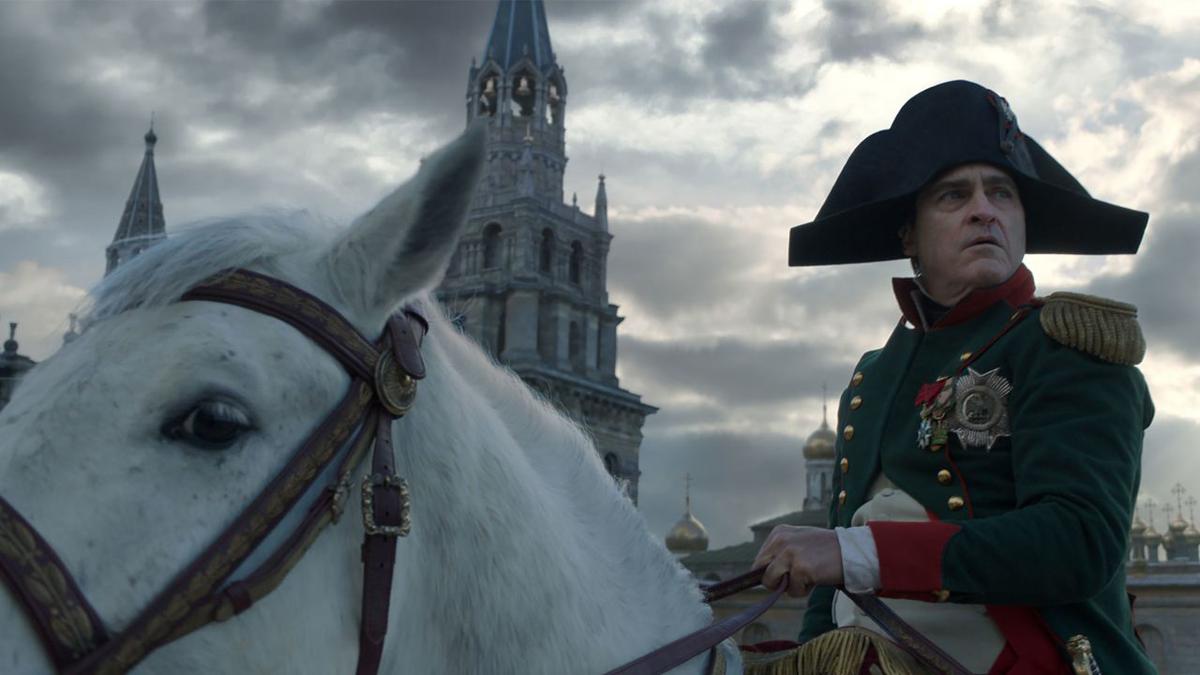Joaquin Phoenix in ‘Napoleon’
Every frame of Ridley Scott’s Napoleon is reminiscent of the great masters. There is the warmth and jewel tones that grab the eye and keep it, whether it is the six magnificently-mounted battle sequences, or the quieter, intimate scenes, or the riotous scenes of the Reign of Terror. Scott’s long time collaborator Dariusz Wolski’s (Prometheus, The Counselor, Exodus: Gods and Kings, The Martian, Alien: Covenant, All the Money in the World, The Last Duel, and House of Gucci) frames are bonafide works of art.
Napoleon
Director: Ridley Scott
Starring: Joaquin Phoenix, Vanessa Kirby, Tahar Rahim, Ben Miles, Matthew Needham, Édouard Philipponnat, Rupert Everett, Catherine Walker
Story line: The public and personal story of the greatest military commander and emperor of France and his passionate love for his adulterous wife, Empress Joséphine
Run time: 157 minutes
There is a lot to love in this bio-pic, but (there always seems to be one!) there is an underlying frustration at opportunities lost in all the glamour and eye candy. If Scott set out to create a hagiographic portrait of Napoleon, why is there no mention of the French general and ruler’s administrative reforms? His audacious military campaigns, which are still studied in war colleges, are presented as luck and not planning — maybe as a tri-cornered hat-tip to his preference for lucky rather than smart generals.
And if one was looking for a nuanced retelling of Napoleon’s life, one is bound to be disappointed as apart from the end credits mentioning the cost of life in all his military campaigns, there is no mention of his draconian policies with respect to his detractors, the conquered countries, the reintroduction of slavery, and other unpalatable things.
Opening with Marie-Antoinette’s (Catherine Walker) terrifying walk to the gallows and her shocking beheading, under the watchful gaze of Napoleon Bonaparte (Joaquin Phoenix) an ambitious Corsican soldier, the film moves quickly to his first military success at the Siege of Toulon. From the moment he sees the aristocratic widow, Joséphine (Vanessa Kirby), he is smitten. He woos her and they marry.

A still from ‘Napoleon’
Military successes follow Napoleon, who nevertheless rushes back to France in the midst of a campaign in Egypt when he hears of Joséphine taking a lover. The public and personal merge as Napoleon becomes First Consul and later Emperor, but reluctantly divorces Joséphine, when she does not produce an heir to the throne. Despite their separation, Napoleon and Joséphine continue to be friends and confidants. The crushing loss in Russia prompts Napoleon’s first exile in Elba and the final battle at Waterloo sees him exiled to Saint Helena, where he dies at the age of 51.
Also Read | Todd Haynes says he is collaborating with Joaquin Phoenix on a period gay romance film
Phoenix tries to breathe life into Napoleon and it is a testament to his craft that he has created a somewhat rounded image of the all-conquering Corsican, with the meager material he has to work with. Scott has been quoted as saying apart from Phoenix, he had another actor in mind for the lead role (was it Adam Driver?) but was blown away by Phoenix’s performance in Joker. Kirby is fire and ice as Joséphine, and one can believe her prompting the love that when it could not conquer at home, going outwards to conquer the world.
Paul Barras (Tahar Rahim), the politician, Caulaincourt (Ben Miles) the diplomat, Lucien (Matthew Needham), Napoleon’s brother, Alexander (Édouard Philipponnat), as the sulky Tsar of Russia and Arthur Wellesley (Rupert Everett) as the sniffy Duke of Wellington, all add the needed silk, ruffles and colour but not much else.
Scott says there is a director’s cut running to four hours and 10 minutes, never mind what the bard said about brevity being the soul of wit. We could still luxuriate in the lovely painterly frames, the exhilarating blood lust of battle, and the attendant disappointment of not being able to sink our teeth into this life that was definitely far from being ordinary.
Napoleon is currently running in theatres